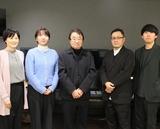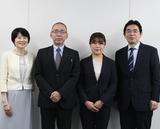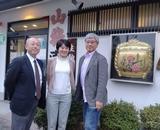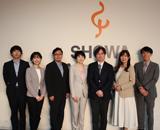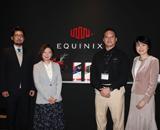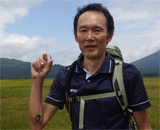September 2021
Disseminating the Principles of YKK's Founder Around the World Through Sustainability
The ideas and sayings of the late Tadao Yoshida, founder of YKK, can be readily seen in the modern concept of "sustainability." Mr. Yoshida's writings, which describe the ideal way for a company to exist within society in terms of a "Cycle of Goodness," are today disseminated internally and externally by all YKK employees across the globe. These writings, which still resonate even amidst the coronavirus pandemic, are a written legacy that Arc Communications is, through its translations, helping to communicate to a broader audience around the world. We asked Ms. Ibuka, General Manager of the Corporate Communications Group, Corporate Planning at YKK Corporation, about the company's principles and how it communicates the company's ideas to the world.

- Profile
- Midori Ibuka: General Manager, Corporate Communications Group, Corporate Planning, YKK Corporation
- Mariko Ohsato: CEO & President, Arc Communications Inc.
- Manami Saito: Chief Project Manager, Translation & Localization Division, Arc Communications Inc.
Principles That Unite Two Different Businesses
Ohsato: Could you start by giving us a brief overview of the YKK Group?
Ibuka: YKK Corporation was founded in 1934 by Tadao Yoshida, and the company inherited his philosophy and principles and made them the basis of its business activities. Currently, our Group consists of 106 companies operating in 72 countries and regions. Around the world, YKK Group employs approximately 44,500 people. Of these, 26,300 are overseas, meaning we already have more overseas employees than Japanese employees. In these circumstances, we work every day to foster and preserve our corporate culture.
Ohsato: When consumers hear the name YKK, the first thing they probably think of is zippers, but YKK Group consists of a fastening business (YKK Corporation) that handles zippers, hook-and-loop fasteners, snaps, buttons, and the like, and an architectural products business (YKK AP Inc.) that handles products such as windows, sashes, and doors for commercial and residential buildings.
Ibuka: That's right. And those two markets are completely different. Nearly 90% of YKK Corporation sales are overseas. On the other hand, 90% of YKK AP Inc. sales are here in Japan. Across these very different businesses, our challenge is to preserve the principles of Tadao Yoshida and make them the spiritual core of both businesses.
The "Cycle of Goodness" Corporate Philosophy Is Connected to Sustainability
Ohsato: Please tell us more about your company principles. Your company is famous for the YKK Philosophy of its founder. What are some of the ideas and methods you have for sustaining and fostering your corporate culture?
Ibuka: At YKK Group, we have the "Cycle of Goodness" corporate philosophy that was conceived by our founder, Tadao Yoshida. The "Cycle of Goodness" states that "no one prospers without rendering benefit to others." A company is an important member of society, and it sustains itself by coexisting with society. When a company shares the benefits of its activities with society, society comes to recognize the value of the company's existence. Sustainability has become an important focus in recent years, but YKK has nurtured a philosophy of sustainability since the time of its founder.
Ohsato: YKK has its own culture, and in terms of business in the broader sense, has been ahead of the times. So, when we talk about CSR, CSV, SDGs, and the like, it feels like the world is only now catching up to YKK.
Ibuka: In a sense, yes. In October 2020, YKK released the "YKK Sustainability Vision 2050," which links our activities to SDGs. When you talk about sustainability, having guiding principles is very important. When I re-read the writings of our founder, I see phrases such as "business is like a bridge," or "the strength of the forest rather than that of a single great tree," which refers to the idea that instead of one person taking the lead, our employees are like trees in a forest that grow together, which in turn causes YKK the company to grow as well. Generally, there tends to be a disconnect between principles and business, but our pragmatic philosophy grew out of our business activities, and that means they fit together perfectly.
Non-Japanese Embrace the Japanese Philosophy
Ohsato: YKK has a strong presence in overseas markets and has many overseas locations, but it must have been difficult to communicate the company culture and the "Cycle of Goodness" to overseas customers and employees. Could you tell us what kind of efforts you had to make with respect to this?
Ibuka: Let me talk about the American example. The person who served as CEO of our U.S. operations for many years (currently retired) played a central role, working with American employees to come up with a code of conduct specifically for the U.S. He had fully immersed himself in the ideas of Tadao Yoshida, and was known in the company as a leading expert in the "Cycle of Goodness," second only to Mr. Yoshida himself. As well, not long before the coronavirus pandemic, we asked him to travel to company locations in countries and regions around the world to spread the word about our principles.
Ohsato: Were you involved in that?
Ibuka: I traveled with him. At the time, I remember being very impressed by how our principles resonated with people regardless of country or culture. It is wonderful to me that the "Cycle of Goodness" can be appreciated by people of different religions and cultures, in companies with different histories. We took the opportunity to create something similar to the U.S. code of conduct for China, based on ideas and proposals from local employees. The employees took it upon themselves to instill the YKK Philosophy in accordance with their own national and regional cultures.
Ohsato: I find it very interesting that the American CEO played a key role in disseminating the YKK Philosophy in China. It means that non-Japanese people can interpret YKK's corporate culture in terms of their own cultural background, then communicate it to other countries.
Ibuka: Yes, exactly. I personally think that when Japanese people try to convey their principles overseas, often these principles fail to take root in the workplace. It's said that currently YKK needs to communicate in 37 or 38 languages. This multilingual translation is exactly where Arc steps in. In a translation, it is very important to reflect the culture behind the words. We have to communicate a single corporate philosophy, the "Cycle of Goodness," in many different languages. Furthermore, the people who are conveying this idea are not themselves Tadao Yoshida.
Ohsato: You set out to create "evangelists" for the message.
Ibuka: Yes, that's right. But it is not easy. These "evangelists" have to be the employees, but they often question themselves and wonder if they are qualified to deliver the message. This is why it is so important that everyone learns, through for example, our in-house Management Principle Study Groups, the historical context of the topics that Tadao Yoshida wrote about, and how they apply to the current era.
Feature Interview Index

